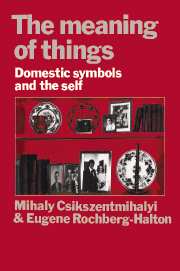
-
Select format
-
- Publisher:
- Cambridge University Press
- Publication date:
- June 2012
- October 1981
- ISBN:
- 9781139167611
- 9780521287746
- Dimensions:
- Weight & Pages:
- Dimensions:
- (228 x 152 mm)
- Weight & Pages:
- 0.46kg, 320 Pages
You may already have access via personal or institutional login
Book description
The meaning of things is a study of the significance of material possessions in contemporary urban life, and of the ways people carve meaning out of their domestic environment. Drawing on a survey of eighty families in Chicago who were interviewed on the subject of their feelings about common household objects, Mihaly Csikszentmihalyi and Eugene Rochberg-Halton provide a unique perspective on materialism, American culture, and the self. They begin by reviewing what social scientists and philosophers have said about the transactions between people and things. In the model of 'personhood' that the authors develop, goal-directed action and the cultivation of meaning through signs assume central importance. They then relate theoretical issues to the results of their survey. An important finding is the distinction between objects valued for action and those valued for contemplation. The authors compare families who have warm emotional attachments to their homes with those in which a common set of positive meanings is lacking, and interpret the different patterns of involvement. They then trace the cultivation of meaning in case studies of four families. Finally, the authors address what they describe as the current crisis of environmental and material exploitation, and suggest that human capacities for the creation and redirection of meaning offer the only hope for survival. A wide range of scholars - urban and family sociologists, clinical, developmental and environmental psychologists, cultural anthropologists and philosophers, and many general readers - will find this book stimulating and compelling.
Contents
Metrics
Altmetric attention score
Full text views
Full text views help Loading metrics...
Loading metrics...
* Views captured on Cambridge Core between #date#. This data will be updated every 24 hours.
Usage data cannot currently be displayed.
Accessibility standard: Unknown
Why this information is here
This section outlines the accessibility features of this content - including support for screen readers, full keyboard navigation and high-contrast display options. This may not be relevant for you.
Accessibility Information
Accessibility compliance for the PDF of this book is currently unknown and may be updated in the future.


